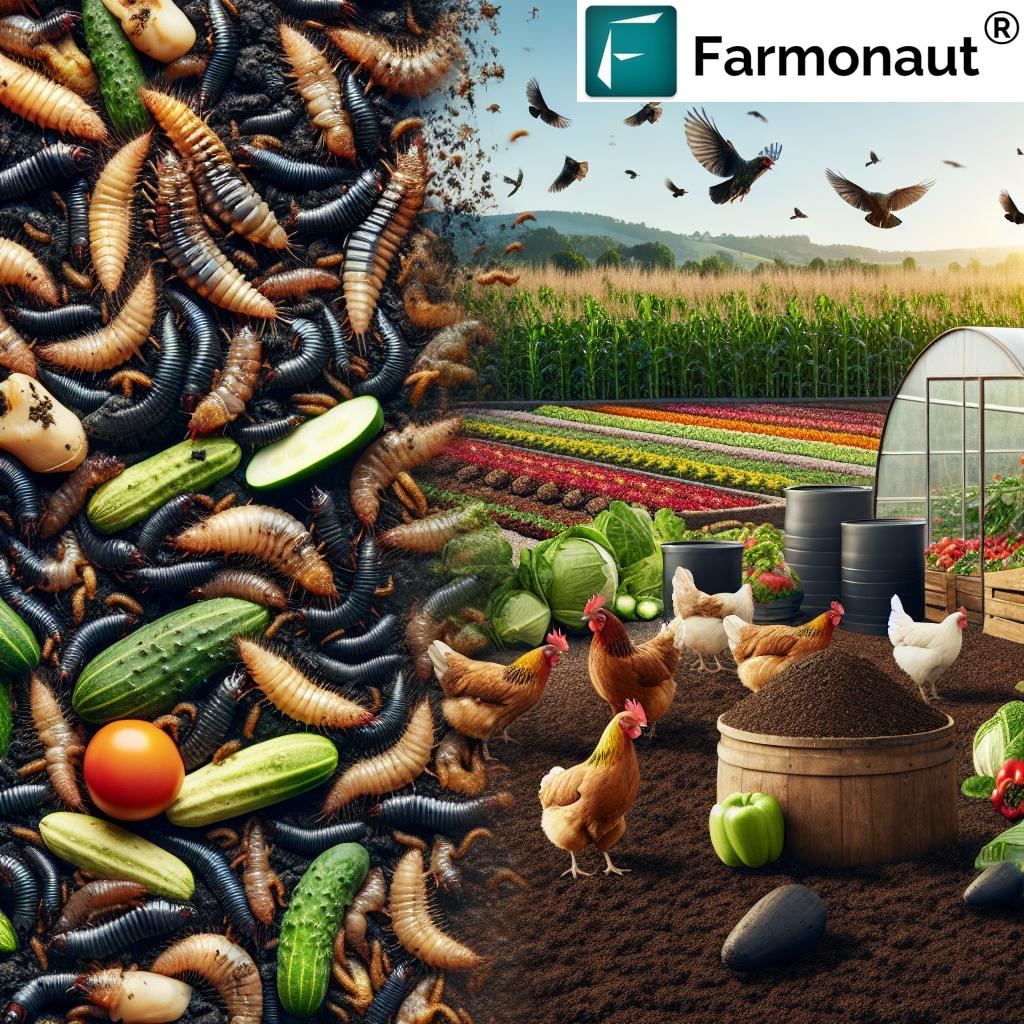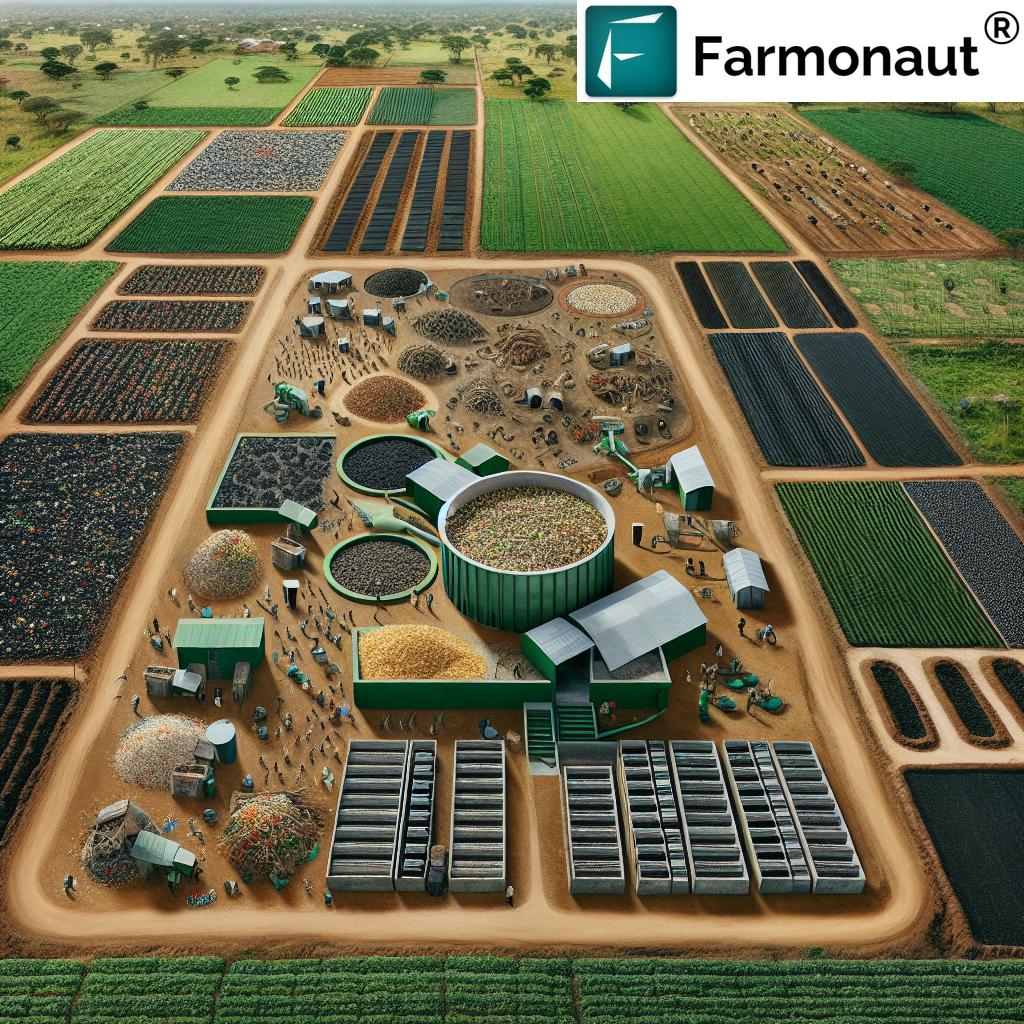Transforming Zimbabwe’s Agriculture: How Maggot Farming Revolutionizes Sustainable Livestock Feed and Waste Management
“Black soldier fly larvae farming in Zimbabwe reduces chicken feed costs by 40%, promoting sustainable livestock production.”

In the heart of southeastern Africa, a quiet revolution is taking place. Zimbabwe, a nation long grappling with agricultural challenges, is witnessing the dawn of a new era in sustainable farming practices. We’re here to share an inspiring story of resilience, innovation, and transformation that’s changing the face of rural agriculture in this southern African nation.
The Challenge: Drought, Disease, and Rising Costs
For years, farmers in Zimbabwe have faced a perfect storm of adversities. Persistent droughts have ravaged traditional crops like corn, the country’s staple. Outbreaks of diseases such as cholera have further strained communities already struggling with poor sanitation. Add to this the skyrocketing costs of livestock feed, and you have a recipe for agricultural crisis.
In Nyangambe, a small farming community, these challenges hit hard. Farmers like Mari Choumumba saw their livelihoods threatened as corn yields plummeted and chicken feed prices soared. With feed costs consuming up to 80% of production expenses, many smallholder farmers found themselves at a crossroads.
An Unlikely Solution: Enter the Maggot
When experts from the Zimbabwean government and the U.S. Agency for International Development (USAID) proposed maggot farming as a solution, the initial reaction was one of alarm and skepticism. The very idea of cultivating insects associated with rot and disease seemed counterintuitive to many farmers.
However, this wasn’t just any maggot farming. The project focused on breeding black soldier fly larvae, a species not linked to disease transmission. These larvae possess a remarkable ability to convert organic waste into high-quality protein, making them an ideal sustainable feed source for livestock.
The Transformation Begins
As the community learned more about this innovative farming method, perceptions began to shift. The potential benefits were too significant to ignore:
- Cost Reduction: Black soldier fly larvae farming could slash chicken feed costs by approximately 40%.
- Waste Management: The larvae’s voracious appetite for organic waste offered a solution to the country’s 1.6 million tons of annual waste production.
- Sustainable Protein Source: The high-protein content of the larvae made them an excellent feed alternative for livestock.
- Environmental Benefits: By recycling organic waste, the method contributes to reducing greenhouse gas emissions.
For farmers like Choumumba, this was a game-changer. Within a year, her skepticism had transformed into success as she mastered the art of cultivating these protein-rich larvae.
The Process: From Waste to Wonder
The black soldier fly larvae farming process is a marvel of natural efficiency:
- Waste Collection: Farmers gather organic waste from local markets and households.
- Breeding: Adult black soldier flies lay eggs in specially designed containers.
- Larval Growth: The hatched larvae feed voraciously on the collected waste.
- Harvesting: After about two weeks, the protein-rich larvae are harvested.
- Processing: The larvae are dried and processed into livestock feed.
This cycle not only provides a sustainable feed source but also addresses pressing waste management issues in the region.
“Innovative maggot farming techniques in rural Zimbabwe transform food waste into valuable resources, addressing food security challenges.”
Impact on Livestock and Agriculture
The introduction of black soldier fly larvae as feed has had a profound impact on livestock production in Zimbabwe:
- Improved Chicken Health: The high-quality protein in the larvae feed has led to healthier, more robust chickens.
- Increased Egg Production: Farmers report higher egg yields from their hens.
- Diversification of Livestock: The success with chickens has encouraged farmers to explore using the feed for other animals like pigs and fish.
Moreover, the project has indirectly benefited crop production. The residue from the larval feeding process makes an excellent organic fertilizer, enhancing soil quality and crop yields.

Community Adoption and Economic Impact
The journey from skepticism to widespread adoption has been remarkable. Initially, only about 5% of farmers showed interest in the project. However, as the benefits became apparent, this figure soared to around 50%. The economic impact has been significant:
- Additional Income Streams: Farmers like Choumumba now earn extra income by selling surplus larvae feed, eggs, and free-range chickens.
- Empowerment of Women Farmers: The project has created a network of women farmers, fostering collaboration and economic independence.
- Resilience Against Climate Change: By diversifying their farming activities, communities are better equipped to handle extreme weather events and droughts.
The success of this venture exemplifies how innovative agricultural practices can create substantial benefits for both farmers and the environment, changing lives in the process.
Environmental Benefits and Sustainability
The environmental impact of this innovative farming method cannot be overstated:
- Waste Reduction: By converting organic waste into valuable resources, the project significantly reduces landfill waste.
- Lower Carbon Footprint: The local production of feed reduces the need for imported soya and other feed ingredients, lowering transportation-related emissions.
- Water Conservation: Compared to traditional crop-based feed production, black soldier fly farming requires minimal water.
- Biodiversity Support: The project indirectly supports biodiversity by reducing the pressure on wild fish stocks often used in animal feed.
These environmental benefits align perfectly with global efforts to combat climate change and promote sustainable agriculture practices.
The Role of Technology in Sustainable Farming
While the black soldier fly project is revolutionizing livestock feed production, other technological advancements are further transforming Zimbabwe’s agricultural landscape. Farmonaut, a leading agricultural technology company, is at the forefront of this digital revolution in farming.
Farmonaut’s satellite-based farm management solutions offer valuable tools for farmers adapting to climate change and extreme weather events. Through its advanced platform, farmers can access:
- Real-time crop health monitoring
- AI-based advisory systems
- Resource management tools
These technologies complement innovative farming methods like black soldier fly cultivation, creating a comprehensive approach to sustainable agriculture.
Explore Farmonaut’s solutions:
The Future of Agriculture in Zimbabwe
The success of the black soldier fly project in Zimbabwe opens up exciting possibilities for the future of agriculture in the region:
- Scaling Up: There’s potential to expand the project to more communities across Zimbabwe and neighboring countries.
- Research and Development: Universities and research institutions are showing interest in further studying and improving the efficiency of insect farming.
- Policy Support: The government is considering policies to support and regulate insect farming as a recognized agricultural practice.
- Integration with Other Technologies: Combining insect farming with other innovative agricultural technologies could lead to even more sustainable and efficient farming systems.
Challenges and Opportunities
While the progress has been impressive, challenges remain:
- Cultural Acceptance: Overcoming the stigma associated with insect farming in some communities.
- Infrastructure Development: Ensuring proper facilities for large-scale insect breeding and processing.
- Market Development: Creating robust markets for insect-based feed products.
- Regulatory Framework: Developing appropriate regulations for this new farming sector.
These challenges, however, also present opportunities for innovation, job creation, and further research in sustainable agriculture.
Comparison Table: Benefits of Black Soldier Fly Larvae Farming in Zimbabwe
| Aspect | Before Implementation | After Implementation |
|---|---|---|
| Chicken Feed Costs | High (80% of production costs) | Reduced by 40% |
| Protein Source for Livestock | Limited, expensive | Abundant, affordable |
| Organic Waste Management | Poor | Efficient recycling |
| Crop Yields | Low due to poor soil quality | Improved with organic fertilizer |
| Livestock Health | Variable | Improved |
| Additional Income Streams | Limited | Diverse (feed, eggs, chickens) |
| Community Adoption Rate | 5% initially | Around 50% |
| Environmental Impact | High waste, emissions | Reduced waste, lower emissions |
Conclusion: A Sustainable Future for Zimbabwe’s Agriculture
The story of maggot farming in Zimbabwe is more than just an agricultural success; it’s a testament to human ingenuity and resilience in the face of adversity. From initial skepticism to widespread adoption, this innovative approach has not only addressed immediate challenges like feed costs and waste management but has also paved the way for a more sustainable and resilient agricultural future.
As we look to the future, the integration of traditional knowledge with modern technologies like those offered by Farmonaut presents exciting possibilities. By embracing these innovative farming methods and leveraging advanced agricultural technologies, Zimbabwe and other nations in the region can build a more food-secure, economically vibrant, and environmentally sustainable future.
The transformation we’re witnessing in Zimbabwe’s agriculture sector serves as an inspiring model for other regions facing similar challenges. It shows that with creativity, perseverance, and the right support, even the most unlikely solutions can lead to remarkable transformations.
FAQ Section
- Q: Is black soldier fly larvae farming safe for the environment?
A: Yes, it’s considered environmentally friendly as it recycles organic waste and reduces greenhouse gas emissions. - Q: How does this method compare to traditional livestock feed production?
A: It’s more sustainable, requires less water and land, and produces high-quality protein at a lower cost. - Q: Can black soldier fly larvae be used to feed all types of livestock?
A: While primarily used for chickens, research is ongoing for its use in feeding pigs, fish, and other animals. - Q: How does maggot farming address food security issues?
A: By providing a cost-effective protein source for livestock, it enhances food production and reduces dependency on expensive imported feeds. - Q: What role does technology play in this agricultural innovation?
A: Technologies like Farmonaut’s satellite-based solutions complement these innovative farming methods, offering tools for better farm management and climate resilience.
For more information on how technology is revolutionizing agriculture, visit Farmonaut’s API or check out their API Developer Docs.






